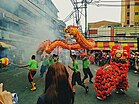
Back Chinese Nuwejaar Afrikaans رأس السنة الصينية Arabic চীনা নৱবৰ্ষ Assamese Añu Nuevu chinu AST Çin Yeni ili Azerbaijani Bagong Taon nin Tsino BCL Китайска Нова година Bulgarian Tahun puga Cina BJN চীনা নববর্ষ Bengali/Bangla ཧྲང་རྒྱལ་རབས་ Tibetan
This article may require copy editing for grammar, style, cohesion, tone, or spelling. (January 2024) |
| Chinese New Year | |
|---|---|
Clockwise from the top: Fireworks over Victoria Harbour in Hong Kong; lion dance in Boston Chinatown; red Lanterns on display; complex patterns woven at dragon dance in Manila; red envelopes; firecrackers exploding; and spring couplet | |
| Also called | Spring Festival, Lunar New Year |
| Observed by | Chinese people and Sinophone communities[1] |
| Type | Cultural Religious (Chinese folk religion, Buddhist, Confucian, Taoist, some Christian communities) |
| Significance | Commemoration of the beginning of a new year on the traditional lunisolar Chinese calendar |
| Celebrations | Lion dances, dragon dances, fireworks, family gathering, family meal, visiting friends and relatives, giving red envelopes, decorating with chunlian couplets |
| Date | First day of the first Chinese lunisolar month |
| 2023 date | 22 January |
| 2024 date | 10 February |
| 2025 date | 29 January |
| Frequency | Annual |
| Related to | Lantern Festival and similar celebrations in other Asian cultures |
| Chinese New Year | |||||||||||||||||||||||||||||||||
|---|---|---|---|---|---|---|---|---|---|---|---|---|---|---|---|---|---|---|---|---|---|---|---|---|---|---|---|---|---|---|---|---|---|
 "Chinese New Year" in Traditional (top) and Simplified (bottom) Chinese characters | |||||||||||||||||||||||||||||||||
| Traditional Chinese | 春節 | ||||||||||||||||||||||||||||||||
| Simplified Chinese | 春节 | ||||||||||||||||||||||||||||||||
| Literal meaning | "Spring Festival" | ||||||||||||||||||||||||||||||||
| |||||||||||||||||||||||||||||||||
| Agricultural Calendar New Year | |||||||||||||||||||||||||||||||||
| Traditional Chinese | 農曆新年 | ||||||||||||||||||||||||||||||||
| Simplified Chinese | 农历新年 | ||||||||||||||||||||||||||||||||
| |||||||||||||||||||||||||||||||||
| Traditional Chinese New Year | |||||||||||||||||||||||||||||||||
| Traditional Chinese | 中國傳統新年 | ||||||||||||||||||||||||||||||||
| Simplified Chinese | 中国传统新年 | ||||||||||||||||||||||||||||||||
| |||||||||||||||||||||||||||||||||
Chinese New Year or the Spring Festival (see also § Names) is a festival that celebrates the beginning of a new year on the traditional lunisolar Chinese calendar. Marking the end of winter and the beginning of spring, observances traditionally take place from Chinese New Year's Eve, the evening preceding the first day of the year, to the Lantern Festival, held on the 15th day of the year. The first day of Chinese New Year begins on the new moon that appears between 21 January and 20 February.[a]
Chinese New Year is one of the most important holidays in Chinese culture. It has influenced similar celebrations in other cultures, commonly referred to collectively as Lunar New Year, such as the Losar of Tibet, the Tết of Vietnam, the Korean New Year, and the Ryukyu New Year.[3][4][5] It is also celebrated worldwide in regions and countries that house significant Overseas Chinese or Sinophone populations, especially in Southeast Asia. These include Singapore,[6] Brunei, Cambodia, Indonesia, Malaysia, Myanmar,[7] the Philippines,[8] Thailand, and Vietnam. It is also prominent beyond Asia, especially in Australia, Canada, France, Mauritius,[9] New Zealand, Peru,[10] South Africa, the United Kingdom, and the United States, as well as in many European countries.[11][12][13]
The Chinese New Year is associated with several myths and customs. The festival was traditionally a time to honour deities as well as ancestors.[14] Within China, regional customs and traditions concerning the celebration of the New Year vary widely,[15] and the evening preceding the New Year's Day is frequently regarded as an occasion for Chinese families to gather for the annual reunion dinner. It is also a tradition for every family to thoroughly clean their house, in order to sweep away any ill fortune and to make way for incoming good luck. Another practiced custom is the decoration of windows and doors with red paper-cuts and couplets. Popular themes among these paper-cuts and couplets include good fortune or happiness, wealth, and longevity. Other activities include lighting firecrackers and giving money in red envelopes.
- ^ "Asia welcomes lunar New Year". BBC. 1 February 2003. Retrieved 7 November 2008.
- ^ Aslaksen, Helmer (17 July 2010). "The Mathematics of the Chinese Calendar" (PDF). Archived from the original (PDF) on 21 August 2016.
- ^ Yeung, Jessie (29 January 2023). "Is it Chinese New Year or Lunar New Year? Depends who you ask". CNN.
- ^ Roy, Christian (2005). Traditional Festivals: A Multicultural Encyclopedia. ABC-CLIO. p. 320. ISBN 978-1-57607-089-5.
- ^ "Lunar New Year Ceremonies Live On in the Okinawa Islands". nippon.com. 28 February 2019. Retrieved 30 January 2022.
- ^ "Chinese New Year 2011". VisitSingapore.com. Retrieved 2 November 2011.
- ^ "Chinese New Year Celebrated in Grand Scale in Yangon". Mizzima.com. Retrieved 28 January 2019.
- ^ "Philippines adds Chinese New Year to holidays". Yahoo News Philippines. 2 December 2011. Retrieved 29 June 2013.
- ^ "Festivals, Cultural Events and Public Holidays in Mauritius". Mauritius Tourism Authority. Archived from the original on 11 February 2016. Retrieved 28 January 2012.
- ^ "Peru leads Chinese New Year celebrations in Latin America". China Daily. Retrieved 18 January 2022.
- ^ Crabtree, Justina (16 February 2018). "As the Lunar New Year celebrations begin, CNBC looks at Chinatowns across the world". CNBC.
- ^ "Happy Chinese New Year! The year of the Dog has begun". USA TODAY.
- ^ "Chinese New Year and its effect on the world economy". BostonGlobe.com.
- ^ "Chinese New Year". History.com. Retrieved 9 February 2013.
- ^ "The Year of the Dog – Celebrating Chinese New Year 2018". EC Brighton. 16 February 2018. Retrieved 13 November 2018.
Cite error: There are <ref group=lower-alpha> tags or {{efn}} templates on this page, but the references will not show without a {{reflist|group=lower-alpha}} template or {{notelist}} template (see the help page).






